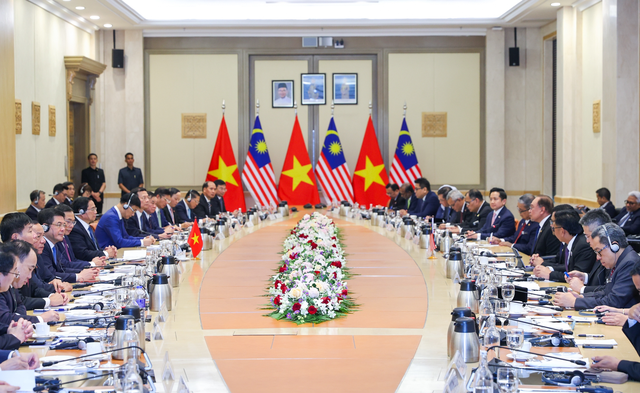Viet Nam vows to push for inclusive and sustainable ASEAN
VGP – Viet Nam will coordinate closely with Malaysia – current ASEAN Chair – and other countries in implementing this year's priorities towards an "inclusive and sustainable" ASEAN, said Prime Minister Pham Minh Chinh.

The summit meeting between Prime Minister Pham Minh Chinh and Malaysian Prime Minister Anwar Ibrahim in Kuala Lumpur, Malaysia, May 25, 2025. Photo: VGP
Pham made the above statement during his summit meeting with Malaysian Prime Minister Anwar Ibrahim in Kuala Lumpur on May 25.
Both Pham and Anwar agreed to maintain ASEAN's common position on the East Sea issue, continue coordination in the process of negotiations on a substantial and efficient Code of Conduct in the East Sea (COC) in accordance with international law, especially the 1982 United Nations Convention on the Law of the Sea.
Regarding bilateral aspect, the two Prime Ministers expressed their pleasure at the growth of the relations between Viet Nam and Malaysia, especially after the two countries upgraded ties to a Comprehensive Strategic Partnership in November 2024.
Political and diplomatic relations have been increasingly strengthened while economic - trade - investment cooperation is a bright spot in the overall relationship between the two countries, with the two-way trade turnover reaching US$14.2 billion in 2024, the two leaders noted.
Malaysia remains among top 10 countries with the largest investment in Viet Nam, with a total registered capital of more than US$13 billion.
The two sides also acknowledged the positive developments in defense - security, energy, education - training, science - technology, tourism, labor cooperation and people-to-people exchange, especially the National University of Viet Nam signed a cooperation document with the National University of Malaysia on the occasion of Pham's ongoing visit
Both sides agreed to continue delegation exchanges and contacts at all levels and across all channels; work towards the establishment of an annual exchange mechanism between the two countries' senior leaders; continue effective implementation of existing bilateral cooperation mechanisms.
Both sides vowed to double efforts to raise bilateral trade volume to US$20 billion by 2030 in a balanced manner through reducing trade barriers and facilitating trade in goods of both sides' strength such as farm produce, electronics and construction materials.
The two leaders agreed to expand cooperation in the fields of digital economy, circular economy and green economy.
Viet Nam stands ready to be a stable and long-term rice supplier to Malaysia, affirmed Prime Minister Pham, suggesting that Malaysia help Viet Nam to develop Halal industry and that both countries should sign a cooperation agreement in this area.
Both sides agreed to foster cooperation in defense and security domain through signing related cooperation agreements, promoting military industry and training cooperation, establishing cooperation mechanisms between their navy, airforce and coastguard forces, and strengthening joint combat against terrorist groups.
The two leaders promised not to allow any individuals and organizations to use one country's territory against the other.
The two sides underscored the importance of maritime cooperation and mulled over the establishment of a consultation mechanism on maritime issues and a hotline to combat the illegal, unreported and unregulated (IUU) fishing. The Vietnamese side called on Malaysia to support the EC's removal of its "yellow card" warning against Vietnamese seafood exports.
Both sides agreed to consider signing new agreements on aviation and tourism cooperation; increase flight frequency between the two countries; promote cooperation in education, training, labor, agriculture, culture, and sports.
After their summit meeting, the two Prime Ministers witnessed the signing of three cooperation documents between the two countries and co-chaired a press conference to announce the outcomes of their meeting.
Malaysia's main priorities as the Chair of ASEAN in 2025 can be summarized as follows:
(i) to strengthen ASEAN Centrality by promoting strategic trust among nations through sustained dialogues, diplomacy and goodwill. Working together with Member States, Malaysia seeks to forge and expand our economic partnerships with those beyond our borders;
(ii) to push for greater commitment towards enhancing ASEAN intra-trade and investment. Malaysia will ensure that ASEAN will be able to leverage on advances in sciences, technology and innovation, and harness the benefits of digital transformation and new technologies; and
(iii) to ensure that the elements of inclusivity and sustainability, which is the theme of ASEAN-Malaysia Chairmanship 2025, take centre stage in regional Community-building efforts. This will entail greater efforts at narrowing the development gap and inequalities, improving living standards, while mitigating the impacts of climate change./.

